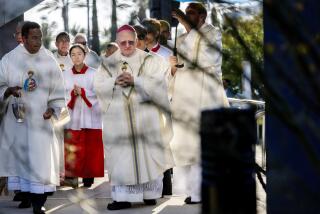Ouster of Members Halted : Court Steps Into Church’s Embroglio
- Share via
A judge intervened between factions of a splintered Southern Baptist congregation Wednesday, barring one from ousting the other pending a hearing.
The temporary restraining order blocked the ouster threatened to be carried out Wednesday night by a group at the First Southern Baptist Church of Anaheim aligned with Pastor John B. Porter.
A lawsuit was filed by 36 members of the congregation who are disgruntled with Porter, who assumed control of the church in 1985.
Superior Court Commissioner Eleanor M. Palk’s ruling forbids any attempt to oust the 36 until after a hearing March 5.
Porter ignored church rules, expanding membership on some church bodies and contracting others to assure his followers control of all aspects of congregational life, the dissidents alleged in their lawsuit.
But the 11th-hour courtroom drama Wednesday followed a move led by Porter to place the dissidents in a new “inactive” membership category that would have stripped them of their voting rights.
“What they were going to do was essentially throw our clients out of the church organization, to terminate their membership rights,” said John M. Devine, attorney for the dissidents.
Longtime church member and Deacon Wilson Cudd alleged in a sworn statement that Porter’s organizational changes were designed to cut out of the life of the church those members, like himself, who are “disenchanted” with the pastor.
“For this opposition, Dr. Porter is attempting to remove all who oppose him from membership in our church, some of whom have been members of this church for over 30 years,” according to Cudd’s declaration attached to the lawsuit.
Church attorney Jack Brewer called the tension resulting in the lawsuit a sad situation and accused the dissidents of attempting to try the issue in the press.
“It’s a dispute among believers,” Brewer said. “I don’t believe it’s newsworthy.”
The Southern Baptist congregation is a virtually autonomous church body, controlling its own finances and destiny and “not controlled in any manner by a higher church organization,” according to Cudd’s declaration.
Palk’s involvement in the ecclesiastical embroglio was based on the dissidents’ claim that the courts have the authority to decide governance questions for a nonprofit corporations like the congregation without violating constitutional prohibitions on church-state entanglements.
Wednesday’s was a repeat court performance for both factions.
In December, 1985, shortly after Porter assumed the role of pastor, the dissident group filed suit, alleging that it was being unfairly shut out of the church.
Both sides agreed to arbitrate the dispute, but the deal broke down--the dissidents alleging that Porter reneged.
The anti-Porter faction responded with a request that a judge order the church to be involuntarily dissolved. That case is pending.
Cudd and a dozen other dissidents urged Palk to stop Porter in court papers, alleging that their “invaluable property rights” as church members would be destroyed if the judge did not intervene.
Palk’s temporary order bars the church from interfering with the membership of dissidents.
Named as defendants in the lawsuit were church trustees Wilson Pruitt, Earl Stephenson, and Jim Yates, Porter, and five other congregation members.
More to Read
Sign up for Essential California
The most important California stories and recommendations in your inbox every morning.
You may occasionally receive promotional content from the Los Angeles Times.













